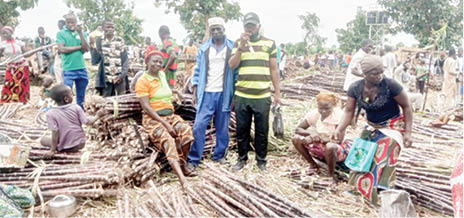Like many other farm produce, the price of sugarcane has gone up beyond the expectations of consumers, especially in security affected local government areas of Munya and Shiroro in Niger State.
Farmers in Munya LGA attributed the cause to many factors but said insecurity remains the major cause.
Though the demand is high, the rising cost of the commodity has raised concern among consumers.
Our correspondent, who visited some of the sugarcane markets in Shiroro and Munya reported that a stalk of small sugarcane cost between N500 and N700 while big sizes were sold for N1,000. A bunch of 12 stalks costs N5,000 to N6,000 depending on the size.
Wholesalers and retailers told Weekend Trust that the high cost was a chain reaction from farmers who offset the cost of inputs on them while they in turn shift the cost, which includes the high cost of transportation, to the final consumers.
Speaking with Weekend Trust, one of the Sugarcane farmers, Haruna Kabiru from Sarkin-Pawa, attributed the rising cost to insecurity and increase in the prices of inputs as well as fuel to pump water.
“The reason is that the prices of inputs, especially fertiliser and chemicals, have gone up. We use water pumping machines to water the sugarcane and the price of fuel has gone up.
“So, when we estimate all these costs, we have to add them to the price of sugarcane to be able to make profit. Also, we are battling with the issue of insecurity. Bandits are disturbing us a lot. Only a few farmers go to the farm now to plant sugarcane because it involves a lot of risks, no thanks to the bandits who constantly attack us on our farms. So, insecurity is also a factor responsible for the rising cost,” he said.
Kabiru lamented that despite the rising cost of inputs, they never got support or intervention from governments at all levels even in terms of subsidised inputs and water pumping machines.
“But what we need most is security to increase production. No matter how prepared we are, we don’t have the powers to provide security; only the government can do that. Even if we have inputs, without security, we can’t do much. It’s quite disturbing because most sugarcane farmers have quit because of insecurity,” he added.
One of the wholesalers at Gunu Sugarcane market, Dorcas Luka from Sarkin-Pawa, said she spent N105,000 on transportation last market day to bring the commodity to the market, adding that she bought the sugarcane at the cost of N1 million from farmers.
“Farmers transfer the cost of inputs to us and we transfer the same to consumers. There are several factors that have caused the price of sugarcane not to drop, including cost of transportation to bring them to market. The price of fuel has gone up seriously. Today, the pickup driver charged me N105,000.
“I bought from farmers in rural communities in Munya LGA. The farmers don’t help us cut them after selling to us. We pay people to cut them and tie them into bundles. The cost from farmers range between N200,000 and N1 million depending on the size.
“Sometimes, we don’t make a profit because of the cost of buying from farmers and cost of transportation. Before the price of fuel went up, we used to spend less on transportation and we usually make profit but things are no longer as they used to be. Farmers buy inputs, especially fertiliser at high cost and they also pay labourers to help them during planting,” she explained.
One of the retailers, Maria David, said “If we get it cheap from farmers, we will equally sell at a cheap rate. I buy from wholesalers to resell and I didn’t get it cheap, and there is also the cost of transportation. The wholesalers come from Sarkin-Pawa and I bought a bundle at the cost of N5,000.
Niger State Government recently signed a Memorandum of Understanding with three companies for sugarcane cultivation and sugar production in the state.
The agreement, which was signed at the Government House Minna, involved Uttham Sucrotech International, Rite Foods Ltd, Legacy Sugar Company Ltd and Niger Foods.
The MoU, which is a three-year project, would see to the establishment of six sugar mills in the state with four to be located between Shiroro and Minna on 148,000 hectares of land.
One of the companies – Uttham Sucrotech Company, would provide 110,000 out growers and other by-products of sugar cane such as refined ethanol, while power and cattle feeds, among others, would also be produced.
Governor Mohammed Umaru Bago, who described the agreement as unprecedented, said the initiative would immensely benefit the people as it will turn around their livelihoods.
The governor, while reiterating the state government’s commitment to making agriculture the mainstay of the economy, disclosed that a billion-dollar sovereign guarantee fund will soon be given to the state, and he intended to channel it to the sugar project.
The chairman of Uttham Sucrotech Company, Rajan Adlakha, said Niger State had vast land that should not be left fallow, stating that the project would empower local farmers for self-sufficiency.
He said the company intends to bring in the best technology for the sugar plants, stressing that Niger State has the capacity to produce the required litres of ethanol in the country.
Chairman, Niger Foods, Sammy Adigun, revealed that Nigeria produces only three per cent of the sugar it consumes, adding that Niger State will change the narrative with the agreement signed.
He disclosed that the excess water released from Shiroro dam would be harvested for the sugar mills.
Adigun said there will be an off-take of 145 million litres of ethanol from the sugar plant and that every year, each benefitting farmer will make between five and six million Naira revenue.
The Managing Director and Chief Executive Officer of Rite Foods, Mr. Seleem Adegunwa, in his remarks said the role of the company in the project was to ensure that there are consumers of the product at the end of production and that the company will offer all the necessary support to ensure that the target is achieved as the company is also providing a similar support in Adamawa State.
However, the farmers said the commitment from the government should go beyond signing of Memorandum of Understanding that hardly comes to fruition, to serious support to farmers to improve their productivity.

 Join Daily Trust WhatsApp Community For Quick Access To News and Happenings Around You.
Join Daily Trust WhatsApp Community For Quick Access To News and Happenings Around You.



